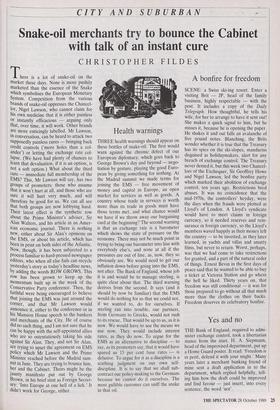A bonfire for freedom
SCENE: a Swiss ski-ing resort. Enter a visiting Brit — JP, head of the family business, highly respectable — with the post. It includes a copy of the Daily Telegraph. How thoughtful, he tells his wife, for her to arrange to have it sent out! She makes a quick signal to him, but he misses it, because he is opening the paper. He shakes it and out falls an avalanche of five pound notes. Blanching, the Brits wonder whether it is true that the Treasury has its spies on the ski-slopes, mandarins disguised as holidaymakers, alert for any breach of exchange control. The Treasury never denied it, but this week two Chancel- lors of the Exchequer, Sir Geoffrey Howe and Nigel Lawson, led the bonfire party which marked their abolition of exchange control, ten years ago. Restrictions bred abuses. It was no coincidence that the mid-1970s, the controllers' heyday, were the days when the frauds were plotted at Lloyd's of London. A Lloyd's syndicate would have to meet claims in fOreign currency, so it needed reserves and rein- surance in foreign currency, so the Lloyd's members waved happily as their money left the country — to be invested, as they later learned, in yachts and villas and smutty films, but never to return. Worst, perhaps, was that we had come to take restrictions for granted, and a part of the natural order of things. Ernest Bevin in the first days of peace said that he wanted to be able to buy a ticket at Victoria Station and go where the hell he liked. Thirty years on, that freedom was still conditional — it was for those prepared to go without all that much more than the clothes on their backs. Freedom deserves its celebratory bonfire.


































































 Previous page
Previous page